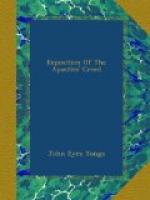The death of Jesus Christ was the result of His being crucified. When He died, the great sacrifice for the sins of the world was accomplished. Death was necessary for the completion of His work, and this was the fact most prominent in Old Testament type and prophecy. “Without shedding of blood is no remission,"[098] and it was to His death as the procuring cause of salvation that the Apostles directed their converts. To the Corinthians Paul wrote, “I delivered unto you first of all that which I also received, how that Christ died for our sins according to the scriptures."[099] It was necessary that the lamb which formed the chief part of the Passover meal should be slain, and so Messiah was brought as a lamb to the slaughter, and when John saw Him in vision it was as a Lamb that had been slain.[100] It is the death of Jesus that we commemorate in the Sacrament of the Lord’s Supper. The bread represents His body “broken for us”; the wine, His blood which was “shed for many for the remission of sins."[101] “We are reconciled to God by the death of His Son."[102] “We have redemption through his blood, even the forgiveness of sins."[103] Statements such as these fail to convey any meaning if Christ did not really die on the cross, or if salvation comes to us in any other way than through His death as an atoning sacrifice. Of the reality of the death there is abundant evidence. It is recorded that, after six hours of suffering on the cross, Jesus gave up the ghost. The soldiers did not break His legs as they did in the case of the malefactors, because they saw and pronounced Him dead already; but one of them inflicted a spear-wound with a force that would have caused death had any life remained. The result was an outflow of blood and water, of itself sufficient evidence that death had done its work upon the Sufferer. Before Pilate permitted the body of Jesus to be delivered to Joseph, he was careful to make sure, by questioning the centurion in charge, that the wonderful prisoner who had caused him so great anxiety was dead. Thus Messiah was cut off, but not for Himself. He stood in the room and stead of sinners, and, though Himself without sin, He tasted death for every man. “He was delivered for our offences.” “The Lord laid on him the iniquity of us all.” His death was not the result of unavoidable circumstances, for it pleased the Lord to bruise Him; and His sacrifice was voluntary, for He said, “I lay down my life ... no man taketh it from me."[104] The penalty of death which He endured did not pertain to Him but to those for whom He died. “He bore our sins in his own body on the tree."[105] We are “justified by his blood."[106] “God hath set him forth to be a propitiation through faith in his blood, to declare his righteousness for the remission of sins that are past, through the forbearance of God ... that he might be just, and the justifier of him that believeth in Jesus."[107] “Therefore as by the offence of one judgment came upon all men to condemnation; even so by the righteousness of one the free gift came upon all men to justification of life. For as by one man’s disobedience many were made sinners, so by the obedience of one shall many be made righteous."[108]




